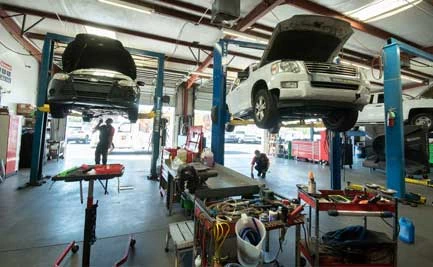Featured

[/image]

Your cars and truck's engine is the heart of your car, and keeping it in leading condition is crucial for optimal performance and long life. Routine engine tune-ups are a great means to keep your cars and truck's wellness, improve gas effectiveness, and prevent pricey repair work in the future. Whether you're a car enthusiast or a person who simply wishes to keep their vehicle running efficiently, these engine tune-up ideas will aid you obtain the most out of your cars and truck.
- Replace Glow Plugs. Stimulate plugs play an important function in starting your engine and making certain smooth combustion. Gradually, ignition system can come to be dirty or worn out, resulting in misfires, decreased gas performance, and harsh idling.
Throughout an engine tune-up, evaluate and change your stimulate plugs if essential. Most cars call for new ignition system every 30,000 to 100,000 miles, relying on the kind. Frequently changing stimulate plugs makes certain proper ignition and optimum engine efficiency.
- Check and Clean the Air Filter. The air filter prevents dust, dirt, and debris from entering your engine. A clogged or dirty air filter limits airflow, triggering your engine to function more difficult and burn even more fuel.
Inspect your air filter during a tune-up and replace it if it's filthy. In messy environments or areas with heavy pollution, you might require to transform the air filter more frequently. A tidy air filter can improve fuel efficiency and prolong the life of your engine.
- Evaluate and Replace Belts and Hose Pipes. Belts and hose pipes are crucial for numerous engine features, such as powering the alternator, water pump, and a/c system. Gradually, these components can break, battle royal, or break, possibly leading to failures.
During a tune-up, check belts and hose pipes for indications of wear and replace them if required. Replacing these components proactively can save you from expensive repair work and stop unexpected failures.
- Clean the Fuel System. Your gas system, including the gas injectors and fuel lines, can accumulate dirt and carbon down payments gradually, reducing engine performance. Cleaning the gas system during a tune-up helps boost performance and gas economy.
You can use a fuel system cleaner or have an expert mechanic execute a more extensive cleansing. This step is especially essential for older lorries or automobiles that frequently drive in stop-and-go web traffic.
- Examine the Battery and Billing System. A healthy and balanced battery is necessary for starting your engine and powering electrical parts. During a tune-up, examine the battery terminals for rust and guarantee the links are tight.
Check the battery's voltage and replace it if it shows indicators of weakness. Additionally, have the alternator and charging system tested to guarantee your battery stays charged throughout operation.
- Adjustment the Engine Oil and Oil Filter. Oil modifications are an essential component of engine maintenance. Engine oil lubricates relocating components, decreases friction, and helps manage engine temperature. With time, oil ends up being contaminated and loses its efficiency.
During a tune-up, change the engine oil and oil filter to maintain your engine running smoothly. Follow your automobile's manufacturer recommendations for oil kind and change intervals.
- Evaluate the Cooling System. The air conditioning system avoids your engine from overheating. Over time, coolant can weaken or end up being contaminated, decreasing its efficiency.
Check the coolant degree and condition throughout a tune-up, and flush and replace it if required. Inspect the radiator, water pump, and hoses for leakages or damages. A properly maintained cooling system aids your engine run at the best temperature and protects against overheating.
- Examine the Ignition System. A malfunctioning ignition system can trigger starting issues and minimized engine performance. Throughout a tune-up, check the ignition coils, distributor cap, and rotor (if suitable) Replace any elements that reveal indications of wear or damages to make sure smooth and dependable engine procedure.
- Pay Attention for Unusual Sounds. During a tune-up, seize the day to pay attention for any kind of unusual engine sounds, such as knocking, ticking, or hissing. These audios can show underlying concerns, such as valve problems, loose components, or exhaust leaks. Dealing with these troubles early can protect against extra comprehensive damages.
- Usage Quality Components and Fluids. When carrying out an engine tune-up, always use high-quality parts and fluids that satisfy your lorry manufacturer's specifications. Inexpensive or inaccurate elements can compromise your engine's efficiency and dependability.
Conclusion: A Well-Tuned Engine is Key to Durability. Regular engine tune-ups are necessary for maintaining your car's performance, efficiency, and reliability. By replacing worn elements, cleaning crucial systems, and dealing with potential issues, you can keep your engine running efficiently for many years to find. Whether you're doing it yourself or depending on a trusted mechanic, investing in tune-ups is a clever means to protect your automobile and enjoy a much safer, smoother trip.
Latest Posts
The Benefits of Consistent Car Maintenance at Montclare Auto Repair Reduces Costs
Find Out Cut Costs on Car Maintenance with Montclare Auto Repair’s Limited-Time Deals
Uncover Reduce Expenses on Car Maintenance with Montclare Auto Repair’s Limited-Time Deals
More
Latest Posts
The Benefits of Consistent Car Maintenance at Montclare Auto Repair Reduces Costs
Find Out Cut Costs on Car Maintenance with Montclare Auto Repair’s Limited-Time Deals
Uncover Reduce Expenses on Car Maintenance with Montclare Auto Repair’s Limited-Time Deals